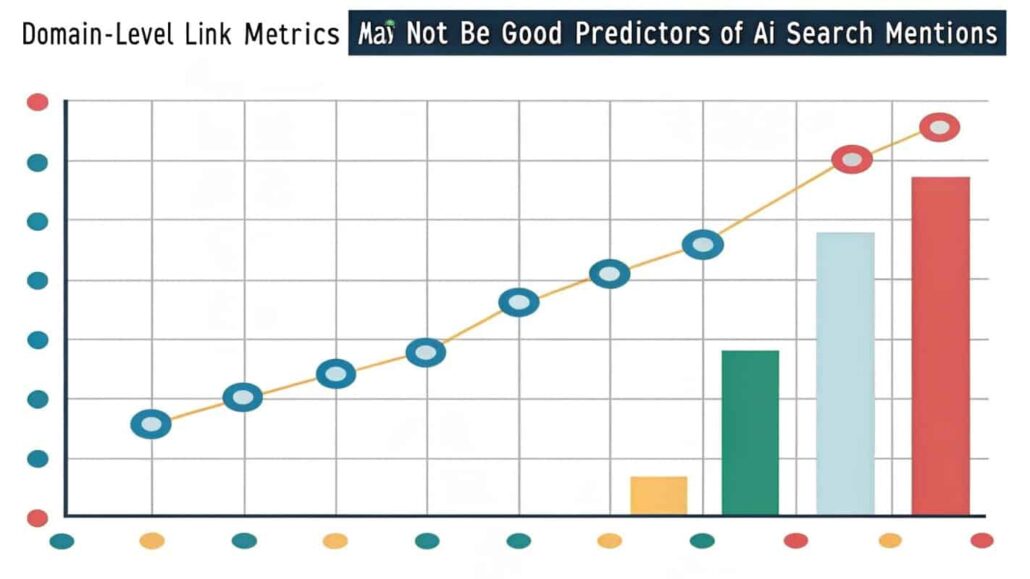
Are Domain-Level Link Metrics Failing
SEO experts and marketers have leaned on domain-level link scores for years to judge a sites authority and guess where it could rank in search results. Numbers like Domain Authority (DA) from Moz or Domain Rating (DR) from Ahrefs were treated almost like magic bullets. The idea was simple: build links from strong-sounding domains, raise the number, and watch the rankings climb. Yet the rise of AI-driven search could be changing the game so fast that those old scores no longer mean what everyone thought they did.
Domain-Level Link Metrics May Not Be Good Predictors
In this post, well dig into why those domain-wide links scores might be losing their punch, and well show you what to watch instead if you want your SEO plan to stay fresh. Well also break down how modern, AI-packed search engines now measure a sites success in ways that go well beyond a single number.
This approach grew popular for a few easy-to-understand reasons:
- Simplicity and Accessibility: Just by glancing at a domain score, anyone can see how strong that site looks.
- Link-Building Strategies: SEOs look for high-scoring domains when planning where to ask for backlinks.
- Broad Predictivity: For years, a higher domain number usually meant the site also performed better in search results.
These scores gave marketers a handy rule-of-thumb, though quick and easy does not always mean right. Now, with AI changing search, that old rule book is being turned upside down.
Why AI Search May Render Domain-Level Metrics Obsolete
New, smarter algorithms are completely changing the way search engines grade and rank webpages. Systems like Google’s RankBrain and BERT now use machine-learning to read pages in light of user questions and habits. Because of this, a broad site score feels less complete, and here are the reasons experts point to.
- AI Focuses on Content Relevance Over Domain Authority
Today, AI looks first at how well a single page answers a search rather than at the whole sites reputation. That means:
- A smaller, newer blog post can jump ahead of a giant portal if it nails the question readers are asking.
- Stuffing keywords no longer cuts it; machine learning weighs meaning, tone, and related concepts more heavily.
Several recent studies show that smaller, focused websites tend to climb higher in AI-powered searches. The reason is simple: their posts answer specific questions really well, even if the overall site authority is low.
Entity-Based SEO Is on the Rise
AI now looks at single entities instead of judging domains as a whole. An entity is a clear topic, idea, or keyword linked by facts. Because of this shift, one strong section on your site can outrank weaker pages-even if your overall score is mediocre. Page-level tuning becomes far more crucial, making big-domain metrics less of a deciding factor.
Backlinks Are Being Redefined
For years, a link from a high-DA site meant everything. Now, AI judges backlinks in a new way:
- Relevance Over Quantity: A link from a trusted niche blog matters more than five links from random authority mags.
- Semantic Connection: The engine reads the text around the link to see how well it fits the topic.
- NLP: Modern language models reveal whether a backlink is natural helpful traffic-or just a trick to fool the algorithm.
4. Behavioral Metrics Are Taking Center Stage
Metrics like click-through rate, dwell time, and bounce rate are moving front and center in search rankings. Because these numbers show exactly how people interact with your pages, A-I is starting to favor them more than older stats like Domain Authority or Domain Rating.
That means search engines now care more about how happy users walk away than simply how powerful a site looks on paper.
Why Relying Solely on Domain Metrics May Be Risky
Keeping your eyes glued to those classic domain scores can leave your site stuck or even sliding in the search results. Here are a few reasons leaning on them alone is a gamble:
- False Sense of Authority: A huge domain score can hide thin, low-quality, or off-topic content.
- Missed Opportunities: Chasing only big, high-DA sites for links may push you past smaller, super-relevant sources with lower scores.
- Inefficiency: Pouring time and money into boosting a domain number often fails to pay back once A-I looks at new, different signals.
If your SEO plan still circles the high-DA or DR dream, now is the moment to change direction.
Adapting Your SEO Strategy for AI Search
Search engines are leaning more on AI, and that means old metrics like domain authority matter less. So how can businesses still rank well? These practical moves will help future-proof your strategy:
- Prioritize Depth and Relevance First
Instead of cranking out dozens of shallow posts, invest time in thorough content that actually meets user questions. Use Google Search Console along with keyword tools to find what searchers are really asking.
- Sprinkle in long-tail phrases that narrow the focus.
- Directly solve user pain points and guess what follow-up topics they might type.
- Optimize One Page at a Time
Forget trying to polish the whole site at once; zero in on single pages for serious gains:
- Write catchy, clear headlines and meta tags.
- Add schema markup so you can snag position-zero featured snippets.
- Regularly check each page for relevance, easy reading, and clean layout.
- Aim for Smart, Topical Backlinks
Link building still counts, but mind the quality over sheer numbers:
- Seek links from sites that cover the same topics youre tackling.
- Steer clear of bulk link packages that damage trust.
- Collaborate with smaller niche blogs to strengthen your reach.
- Make Users Stick Around Longer
AI now looks closely at how visitors behave after arriving.
- Streamline your layouts so eyes scan the page easily.
- Use internal links to steer readers to related articles instead of hitting back.
Use Multimedia to Keep Visitors Interested
Adding videos, charts, and images to your articles can turn a plain post into a lively experience. People tend to stay longer when they see colorful infographics or a quick demo video, which lowers bounce rates and shows search engines your page is useful.
Leverage AI Tools for SEO
Artificial-intelligence tools can now scrub your website data faster than a team of human analysts. Programs like Jasper, Surfer SEO, and Clearscope spotlight missing topics, compare your pages to rival sites, and tweak keywords so Google, Bing, and future AI crawlers see exactly what they expect.
Preparing for the Future of Search
Search engines are changing fast. Where backlinks once ruled, machines now weigh relevance, on-page tweaks, and even user behavior much more heavily. If you focus on smart, clear content people truly want, you’ll ride that change instead of getting rolled by it.
The key takeaway? In the new search world, big numbers matter less than helpful answers. Spend time creating real value, and the algorithms will take notice. Are you ready to upgrade your SEO for tomorrow’s engines? Dive into the latest tools and start testing your ideas today.

